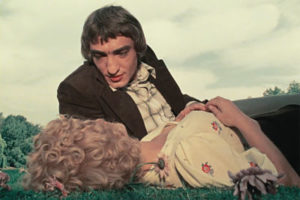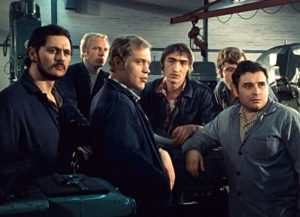STUDIO: Criterion | DIRECTOR: Rainer Werner Fassbinder | CAST: Gottfried John, Hanna Schygulla, Luise Ullrich, Werner Finck, Wolfgang Schenck, Irm Hermann
RELEASE DATE: 10/9/18 | PRICE: DVD $22.97, Blu-ray $27.97
BONUSES: documentary about the series by Juliane Lorenz, interview with scholar Jane Shattuck
SPECS: NR | 495 min. | Drama | 1.37:1 fullscreen | mono | German with English subtitles
Rainer Werner Fassbinder (Ali: Fear Eats the Soul, Fox and His Friends) made one of the finest miniseries to ever appear on television anywhere, Berlin Alexanderplatz (1979). Much lesser known until now was this earlier miniseries from 1972, a curious and fascinating exercise in conveying political messages through the vehicle of the prime-time soap — or, as it was called in Germany in ’72, “a family series.”
Eight Hours Don’t Make a Day was conceived of as eight interlocking telefilms, 90 to 105 minutes in length, that each focus on a “couple” in the saga (one of which is two coworkers, not lovers). The show was cancelled by its network after the fifth film, so we’ll never known how Fassbinder intended to end the series. (Although he presumably at least scripted the remaining films, none of that content is referred to in the supplements here.)
The show is a must-see for Fassbinder fans and for those with an interest in New German Cinema in general. It is not recommended as a newcomer’s intro to RWF’s work, as it is a curious hybrid of styles and storytelling that he tried only once in his wildly prolific 13-year career in cinema.
The plot revolves around Jochen (Gottfried John, Institute Benjamenta), a factory worker who meets and falls in love with Marion (Hanna Schygulla, Love Is Colder Than Death), a perceptive young woman who works in a local newspaper’s classified ads department. The show follows their romance and also devotes much time to Jochen’s feisty grandmother (Luise Ullrich) and her boyfriend (Werner Finck), Jochen’s sister (Renate Roland) and her cruel husband (Kurt Raab), and the other “family” Jochen belongs to, the workers in his department at the factory.
Eight Hours does contain oddly disparate elements, including stylized visuals from Fassbinder and cinematographer Dietrich Lohmann, which come straight out of Fassbinder’s theatrical features. Contrasting with this modernist visual style is some very old-fashioned TV storytelling, including many scenes in which the characters get drunk and blurt out their tangled emotions, and way too many moments of comic relief, most of them featuring the grandmother character, who always “has a plan” and is without question the most cloying character in all of Fassbinder’s work.
Thus the series can easily be classified as the most “normal” thing Fassbinder ever made. The situation is best explained by actress Irm Hermann who, in the documentary included here, expresses her enjoyment at being a part of the show but also handily sums it up as “commercial work” for Fassbinder. Some of the characters and plot developments, she emphasizes, were “not his ideas.”
The reason that Fassbinder went along with the sitcom-like scenes in which the grandmother schemes (and a little boy character mouths off to his adult guardians) was clearly so that he could convey a larger message in the show. For Eight Hours is didactic in a populist way — among the safe-for-TV drama and frequent moments of comic relief are a number of very sharp discussions about the nature of work.
Jochen and his fellow tool-makers have several pointed conversations about the worker’s place in the process of production and how much the bosses profit from the labor of the workers. As Marion summarizes the situation, “Most people do something they really couldn’t care less about….” If it sounds like the series is socialist in its political outlook, it most certainly is.
Ultimately, though, Fassbinder’s subversive “smuggling” of these ideas about the nature of work into a wholesome family series failed to reach its intended audience. The series was strongly disliked by right-wing critics and was also rejected by left-wing reviewers, who mocked Fassbinder’s pretensions and felt his depiction of the workers was facile and unrealistic. Along those lines, one could easily argue that the depiction of the super-friendly company owner, played by Klaus Lowitsch (World on a Wire), is the most unrealistic character in the show, outside of “Grandma.”
The show’s cancellation after only five episodes was thus a turning point for Fassbinder, which sent him back to cinema and his most popular subject — not the brotherhood of workers, but the emotional exploitation of one individual by another. The only hint of that here is the delightfully cruel character played by Kurt Raab, who seems to have wandered in from one of Fassbinder’s other films.
Two strengths of the series are its cast and its music. The former consists of just about all of Fassbinder’s film and theater ensemble of actors; the latter is comprised of a catchy original score by Danish composer “Fuzzy” and an impressive selection of early rock ’n’ roll hits and downbeat singer-songwriter selections. The Fassbinder Foundation, which restored the film, must have invested a fair amount in licensing, as tunes by Elvis, Little Richard, the Everly Brothers, the Rolling Stones, the Velvet Underground, Janis Joplin, Leonard Cohen, and Neil Young are heard on jukeboxes and record players throughout the series.
Film scholar Jane Shattuck provides an overview of the series in an onscreen interview, describing the plot in great detail. She also discusses the series’ feminist aspect, as “Grandma” and Marion are the two wisest, most resourceful characters. Shattuck calls Marion “the mouthpiece of the series,” providing solutions to the problems of the workers.
A documentary about the series made by Fassbinder Foundation head Juliane Lorenz (the editor of Fassbinder’s later films) contain comments from cast members like Hans Hirschmüller (The Merchant of Four Seasons), who describes RWF as “calmness incarnate” on the set, despite the fact that this was the highest-budgeted project Fassbinder had directed at that point.
Vintage TV clips show Fassbinder getting defensive with an interviewer about the politics of the series, and a leftist critic who felt that the show “piles up illusions, pipe dreams!” in its factory sequences.
Most interesting is the comment by the head of the WDR network’s drama department, Gunter Rohrbach, who says that, given the leftist critique of the show, it was good that it was cancelled before the last three episodes were filmed. “It was right to end it,” he declares. “Because we would have provided those people who were critical of what we were doing back then with extra fodder…. I think by taking the route of not doing that, we won.”
|
Buy or Rent Eight Hours Don’t Make a Day
|
|---|


Leave a Reply